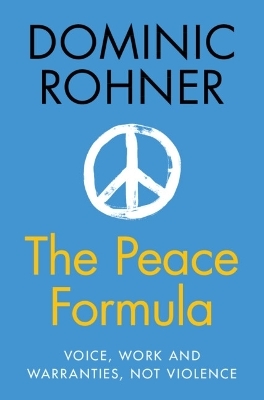
The Peace Formula
Cambridge University Press (Verlag)
978-1-009-43831-5 (ISBN)
Economic forces play a major role in the outbreak and perpetuation of violence, but they also hold the key for positive change. Using a non-technical and accessible style, The Peace Formula attacks a series of misconceptions about how economics has been used to foster peace. In place of these misconceptions, this book draws on rich historical anecdotes and cutting-edge academic evidence to outline the 'peace formula' – a set of key policies that are crucial ingredients for curbing armed conflict and achieving transition to lasting peace and prosperity. These policies include providing jobs (work), democratic participation (voice), and guaranteeing the security and basic functions of the state (warranties). Investigating specific political institutions and economic policies, this book provides the first easily accessible synthesis of this work and explains how 'smart idealism' can help us get the incentives of our leaders right. The stakes could hardly be higher.
Dominic Rohner is a Professor at the University of Lausanne and holds a Ph.D. in Economics from the University of Cambridge. His research on the economics of conflict has won various prizes and been covered by major news outlets worldwide. He leads an international expert group on policies for peace.
Acknowledgements; Part I. Apocalypse No! Why We Should Care: 1. Smart Idealism and the Peace Formula: Introduction; 2. Loss of Lives, Livelihoods and Love: Wars Are Not Good Business; 3. Vicious Cycles of Conflict – Why Wars Today Threaten Our Future; Part II. The Logic of Evil: Why Wars Occur: 4. Poverty, Populations and Petrol: Why Do People Fight?; 5. The Killer in the Boardroom: How Fighting in Funded; Part III. Give Peace a Chance! Getting Incentives Right: 6. Power to the People: Inclusive Democracy and Power-Sharing; 7. State Capacity for Stability; 8. Plenty Makes Peace: Education, Health and Labor Market Policies; 9. Forgiving not Fighting: Fostering Trust and Reconciliation; 10. A Role For All Of Us? Smart Idealism, Global Public Opinion and International Support for Peace; 11. Global Coordination to Curb Conflict; Part IV. The Art of Peace: Take Home Messages: 12. Conclusion; References; Index.
| Erscheinungsdatum | 21.08.2024 |
|---|---|
| Zusatzinfo | Worked examples or Exercises |
| Verlagsort | Cambridge |
| Sprache | englisch |
| Maße | 160 x 235 mm |
| Gewicht | 500 g |
| Themenwelt | Sozialwissenschaften ► Politik / Verwaltung ► Europäische / Internationale Politik |
| Wirtschaft ► Volkswirtschaftslehre ► Mikroökonomie | |
| Wirtschaft ► Volkswirtschaftslehre ► Wirtschaftspolitik | |
| ISBN-10 | 1-009-43831-X / 100943831X |
| ISBN-13 | 978-1-009-43831-5 / 9781009438315 |
| Zustand | Neuware |
| Haben Sie eine Frage zum Produkt? |
aus dem Bereich


